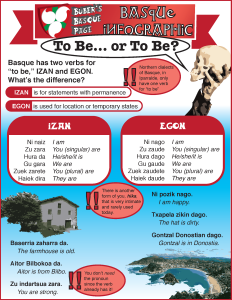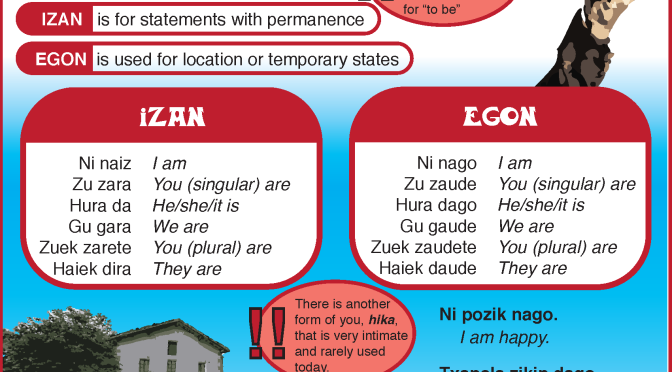For an English speaker, one of the trickier things about Euskara is the verb for “to be.” Like in Spanish, there are two verbs that, in English, we would use to express “to be” – izan and egon. Interestingly, this only occurs in Hegoalde – in Iparralde, they only have one. To first order, izan is like Spanish ser and egon is like estar, but they aren’t fully interchangeable.

- At least to first order, the Basque verb izan is the same as the Spanish ser, while Basque egon is like Spanish estar. There are many places on the internet that say they are completely equivalent, though I have to think there are some differences… does anyone have an example?
- izan is the more permanent form of “to be,” describing enduring properties of things. izan is also used to denote possession and time. izan can describe if something exists: “There are two train stations.”
- One example where in Basque izan is used but in Spanish it would be estar is a situation that has never happened. “I have never been in your house” would use izan in Basque but estar in Spanish.
- egon is more transitory, used to describe situations or characteristics that are in flux or could change. For example, describing where you are or what emotional state you are in would be done with egon. egon can also be used to describe if something exists: “There is no wine” would use egon. When to use izan or egon can become confusing fairly quickly.
- One place where Basque diverges from Spanish is in dynamic phrasing. A phrase like “I am eating” in Spanish would use estar – “Estoy comiendo” – while in Basque it would use izan – “Jaten ari naiz.”
- In some dialects of Euskara, particularly in the north, there is only one verb for “to be” – izan. egon does exist, but it has a more precise meaning of “to stay.”
A full list of all of Buber’s Basque Facts of the Week can be found in the Archive.
Primary sources: izan, Wiktionary
Discover more from Buber's Basque Page
Subscribe to get the latest posts sent to your email.



Greetings,
Very interesting!!! I will forward this e mail to some people at UNM and NMSU. I printed the e mail and the infographic is small. Are the one you created bigger? is so, could you e mail me one. Thank you.
It is super interesting but it needs to be read over and over–at least for me.
Thank you for doing and sharing all this work.
Monique
If you click on the image, a larger version will pop up. Does that help?
Thank you, yes it did. But when I printed it, it was not large enough. I will play with it. I noted your Dad’s house at the bottom. Nice! Monique
Yes, the two different verbs for “to be” are difficult for English speakers, but English has the two verbs “to do” and “to make” whereas Basque has just one for both meanings – “egin”. This proves difficult for Basque speakers learning English.
It is true that having two different verbs for “to be” is difficult for English speakers learning Basque. But by the same token it is hard for Basque speakers learning English to manage the verbs “to do” and “to make” which in Euskara are both “egin”.
Thanks Andrew! That’s a good point and one I didn’t appreciate so much.
Andrew–think how a French Basque who speaks French, Basque and Spanish feels trying to learn English! Monique